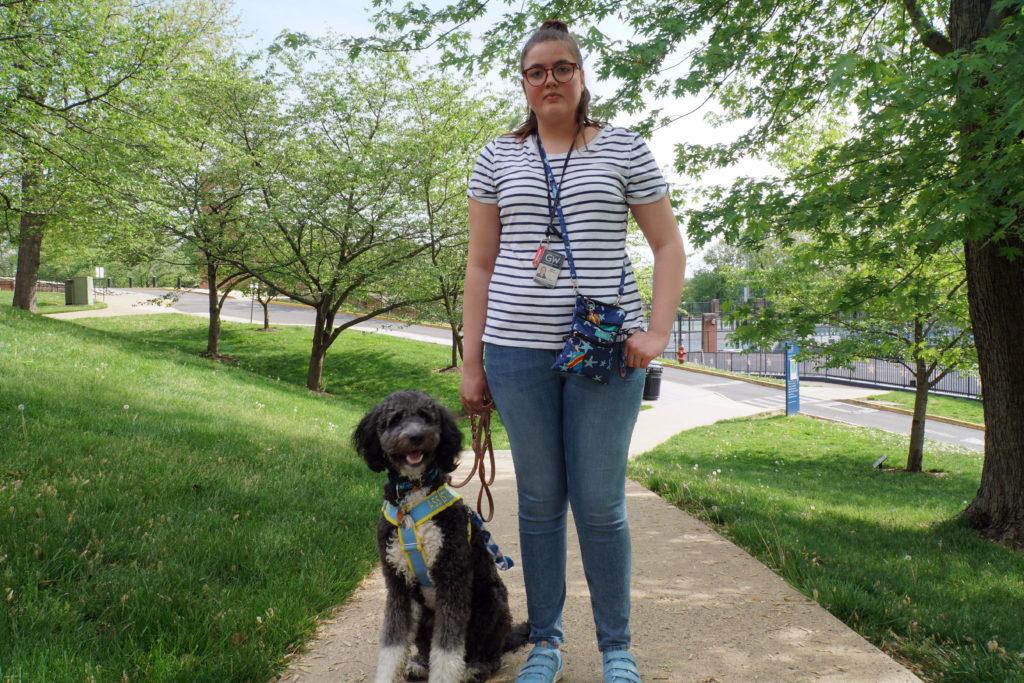Junior Luana Kiwakana and her service dog Benny need to walk up a hill on the Mount Vernon Campus to the Vern Express every day, forcing her to put pressure on her sensitive joints and nerves.
Kiwakana, who lives in Merriweather Hall, has fibromyalgia, a disorder that causes nerve pain, and Ehlers-Danlos syndrome, a connective tissue disorder that makes her joints prone to a dislocation. She said walking up and down hills on the Vern is painful on her knee caps and hips – but she doesn’t have a more comfortable route to the Vex.
Students with disabilities who live on the Vern said the hills and inaccessible residence halls and academic buildings make living on the campus arduous. In interviews, seven students who live on the Vern with a physical disability said the University should add ramps and elevators to buildings on the Vern to ensure they can easily access different campus spaces.
“I have days where I cannot leave my room,” she said. “I have to excuse myself from classes because I physically cannot go out.”
Kiwakana said she chose to live on the Vern for three years to save money, but the campus’ hilly landscape and lack of elevators made her “regret” her decision to stay. She added that her residence hall does not have an elevator so she needs to climb the stairs each time she leaves.
Kiwakana said she requested a single room with Disability Support Services on the Foggy Bottom Campus to accommodate her service dog, but the room in Merriweather Hall was more affordable.
“Essentially the message was, ‘You can’t have both accommodations, have an accessible building and have accommodations for your service dog,’ which was kind of off,” Kiwakana said.
DSS accommodates housing requests for DSS-registered students that are due “slightly earlier” than the regular housing deadlines, according to the DSS website. Requests are considered based on whether a student’s condition is deadly, if the housing accommodation is an “integral component” to the student’s treatment or if the student will face adverse health consequences if the request is not met, the website states.
University spokeswoman Maralee Csellar said GW is “committed” to offering an accessible campus to all students. Csellar said students with disabilities living on the Vern have access to the same resources as students living on Foggy Bottom.
She said all renovated and new buildings are designed to meet current accessibility standards. Csellar added that the University accommodates special housing requests for students registered with DSS and will work with each student to ensure their needs are met, like arranging a different drop-off spot for the Vex.
“We want to contribute to the health, safety and well-being of our students and recognize the importance of having access to resources that will help students thrive academically and socially during their time here at GW,” she said in an email.
About 1,500 students registered with DSS last fall, about a 36 percent spike from the previous year. Students have expressed concerns about accessibility on Foggy Bottom before, and a student filed a disability discrimination complaint with the Department of Education last April that officials responded to over the summer.
Ruchi Amin, a freshman living in a Hensley Hall suite, said she experiences a respiratory issue that causes pain and breathing issues when she inhales dust. Armin said she must complete an hourlong treatment every morning to suppress the issue throughout the day.
She said the Vern’s woodsy environment attracts more bugs and dust than Foggy Bottom, which disrupts her breathing and causes her to cough often. Amin added that her carpeted floor collects dust and hair, which irritates her breathing and prompts her to call FixIt every month to remove the floor particles.
Amin said that when she registered for housing last year, she was unaware that she could register with DSS and receive the housing she needed – an uncarpeted single room with a private bathroom. She said that after she contacted DSS, employees did not change her housing assignment but provided her with an additional refrigerator to store her medications.
“It was inconvenient that they didn’t really acknowledge my condition as a need,” she said. “It wasn’t like I couldn’t hear lectures or I was in a wheelchair and couldn’t go to lectures because it’s an internal condition.”
Rebecca Radillo, a sophomore living on the second floor of Merriweather Hall, experiences pain in her joints from an autoimmune disease. Radillo said walking uphill from the Vex stop to her residence hall and then mounting a flight of stairs to reach her room every day has caused her joints to become “less functional” over the academic year.
Radillo said she was not originally concerned about accessing her residence hall because she thought every University building would be accessible. But Radillo said she was unaware of specific accommodations provided to students with disabilities in residence halls.
“I’m looking into that for next year and in the future,” she said. “I wish I had known that I was going to be able to do that before I got here.”
Lizzie Mintz and Gabby Pino contributed reporting.





